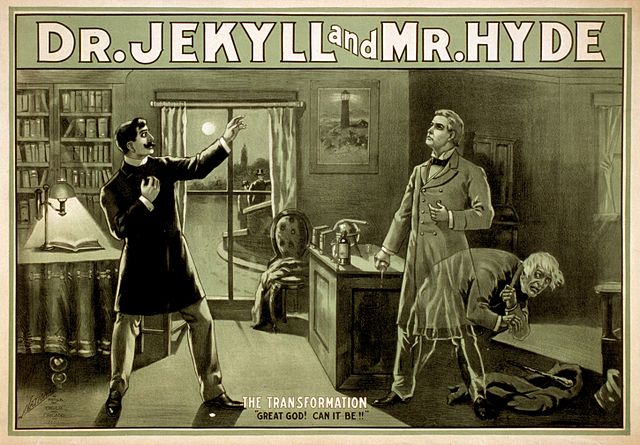
I have been very fascinated lately with this idea of perception. Is what we perceive ourselves to be what is indeed presented to others? There is often a lot of talk regarding appropriateness; what is or what is not acceptable social behavior. Whether about in a social gathering or at work we fall into societally prescribed patterns of behavior. For example, I have found myself in social situations, here at the funeral home, typically during a service, where people prattle on and on about their jobs with such gusto that I begin to wonder ‘Do they really believe that they are happy in their profession? Or do they just feel as though they need to put on this persona of satisfaction?’ Perhaps I am a pessimist, but I am a Gravedigger, therefore I am a realist.
The other day I reread Robert Louis Stevenson’s Strange Case of Dr Jekyll and Mr Hyde. This novella was originally published in 1886 and was sold for one shilling, and to this day there are still references of “Jekyll and Hyde” when noting a person who exhibits contradictory moral behavior from one situation to the next.
Some analysis has said that the novella speaks to modern conditions of dual personalities or split personality disorder. Yet, I prefer the civilized versus animalistic interpretations of the story. If you do not know the story, then be warned as the major plot point will be grazed over next.
On the one hand, we have the civilized Dr. Henry Jekyll, a successful physician who, at least originally, was socially active with fellow upwardly mobile men among his rank. Then, on the other hand, we have Mr. Edward Hyde, who is the darker side of Dr. Jekyll. The character of Hyde is even described as having almost non-human qualities “Mr Hyde was pale, and dwarfish, he gave an impression of deformity without any nameable malformation, he had a displeasing smile…”
Toward the end of the novella Dr. Jekyll can no longer fight his darker side and secludes himself in his home, refusing to see any of his previous associates. Mr. Hyde begins to consume Dr. Jekyll’s being more and more that Dr. Jekyll feels that it is best to avoid his previous relationships, presumably because the darker habits of Mr. Hyde would cause scandal among the society of Dr. Jekyll.
Why then did Dr. Jekyll proceed with this experiment, to become Mr. Hyde? In Dr. Jekyll’s final account he states his belief “that man is not truly one, but truly two.” He goes on to state that for the greater part of his life he chose the moral path, but that he learned to recognize the primitive duality of man. From his experiment, Dr. Jekyll stated that when he became Mr. Hyde he “felt younger, lighter, happier in body; within I was conscious of a heady recklessness, a current of disordered sensual images running like a mill race in my fancy, a solution of the bonds of obligation…” Yet, he said that he knew himself to be more wicked, “tenfold more wicked.” The curiosity here is that he felt a slave to morality as Dr. Jekyll but felt happier, younger, more free as Mr. Hyde, but something about Mr. Hyde’s freedom made him feel more wicked.
Dr. Jekyll says that he imagines that the human soul is a battle ground for an angel and a fiend. One could argue that Dr. Jekyll was the angel and Mr. Hyde was the fiend, but the argument here will point that the devil took over the angel.
There is much more that can be pondered from this classic tale, such as the duality of human nature. My personal favorite exploration of this tale still lies within the aspect of the importance of reputation, the perception of appearance, decorum, and what is and is not socially acceptable behavior.
My friends if you have not yet read the Strange Case of Dr Jekyll and Mr Hyde please do so. You can read it here for free. Please read, and ponder for yourselves the meanings within.
-Gravedigger


